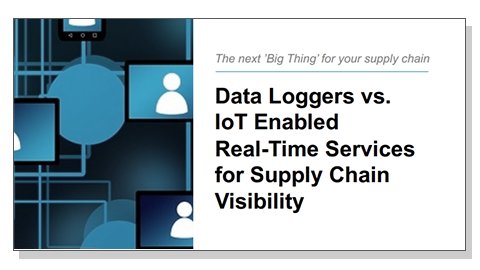THE NEXT GENERATION DATA LOGGING WITH ARVIEM
.
Why are conventional data loggers not enough for the needs of today's supply chains?
.
Monitoring conditions such as temperature, humidity, pressure and CO2 emissions as well as theft, vibrations, shocks or tampering is a must in supply chain management. These conditions are especially important within the pharmaceutical, industrial manufacturing, healthcare, food & beverages and the chemical industries.
While traditional data loggers are widely used in supply chains to fulfil condition monitoring tasks throughout the supply chain, these electronic devices are going out of fashion and have become obsolete to modern businesses with their significant limitations.
.
Find a great comparison of the available solutions in the following knowledgeable study from Arviem!
Initially, the conventional data loggers record your cargo’s data at specific intervals without transmitting them during the transportation and can be retrieved after the shipment reaches the final destination depriving supply chain managers to mitigate disruptions and plan corrective actions if the cargo meets unfavourable conditions. So, your data with the shipment conditions is stored in a single device which is riding along with the cargo without equipped communication technologies to send real-time data; thus it cannot be used for planning pick up dates and further analytics.
Companies using traditional data logger technologies might spend more for cargo monitoring devices, which seem to be a cheaper solution at first, but the added extra costs (e.g. storage, administrative tasks of data extraction, technical expertise and data storage requirements) make the overall solution comparatively expensive. Not to mention the decommissioning of the one-time-use data loggers, that create extra waste that might affect the sustainability initiatives of the organisation.
In contrast to the next generation of data logging equipment has emerged by the Internet of Things (IoT). Besides the functionalities offered by traditional data loggers, IoT enabled devices are additionally equipped with real-time sensing wireless data transfer technology either using WiFi or Cellular. They can be used to monitor the shipments and can transfer the recorded data automatically in real-time and 24/7.
The shipment information is transferred to remote cloud storage, and the analysis can be done remotely in real-time. Moreover, the required alerts & notifications can be sent immediately to supply chain, logistics & operations managers and all interested parties - in case something goes wrong with the cargo - data can be accessed at the same time via an easy to use cloud-based user dashboard. When the data transfer happens automatically on the cloud, no additional infrastructure is required for data transfer or data analysis.
This more sophisticated solution gives you real-time data updates on your shipments, allowing you to create intelligent reports on performance management or various quality metrics with just a few clicks, which also can be used for making predictions on efficient management of your future shipments.
.
IoT enabled real-time data analysis does not only solve the challenges faced by conventional data loggers but also opens new frontiers.
Data intelligence is the crucial component that analyses and accumulates information on shipments, exposes risks and empowers your businesses to make better decisions!
Download Arviem’s White Paper to discover the right solution for real-time cargo monitoring and meet the experts at TRANSLOG Connect 2018 in Budapest!
.
.
Source: www.arviem.com
Follow us and join our online professional business community on social media!
Did you like the article?

